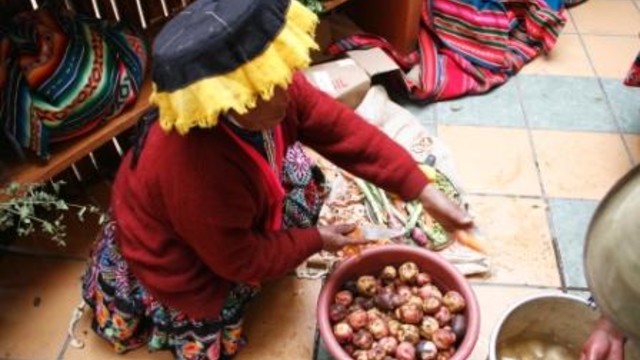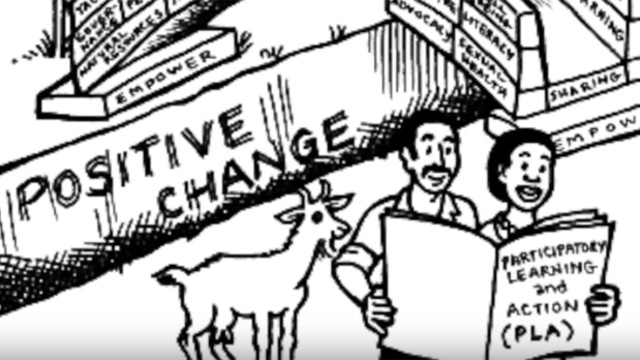RRA Notes 19: Training
This special issue of RRA Notes focuses on the need to move towards a new learning paradigm for agriculture and rural development.
- Participatory Learning and Action: a journal for newcomers and experienced practitioners alike
- About PLA: Background, aims and history of the journal
- Explore the archive: browse and download issues or individual articles
February 1994
Guest Editor: Jules Pretty
Evidence suggests that in order to develop a new learning paradigm, there are three essential areas to tackle. These are:
- new methodologies for partnerships, dialogue, participatory analysis and sharing;
- new learning environments for professionals and rural people to develop capacities; and
- new institutional environments, including improved linkages within and between institutions.
The most sustainable solutions lie in the overlapping central sector of these three areas. The papers in this issue of RRA Notes are seeking to explore how we can better understand the process of moving towards this central zone. Many issues are identified in the 26 papers that are important for trainers and facilitators of learning.
This work is licensed under the Creative Commons Attribution-Non-Commercial-Share Alike 3.0 Unported License. Content can be freely reproduced for non-commercial purposes, provided the source is fully acknowledged.
Follow the links below to download the whole issue or individual articles in pdf format.
Contents
Editorial: Training for learning
Jules Pretty
Section A: Training in universities
PRA training in universities: some thoughts prompted by a recent workshop in Canada
Andy Inglis and Janice Jiggins
RRA training in a UK-based rural development course
Mick Howes
PRA exercise in an Indian village – a retrospective evaluation of the process
N. Narayanasamy
RRA training in a US Masters programme: the director's view
Stephen Howard
RRA training in a US masters programme: the students' view
Tracy Mygrant
Learning by doing to enhance local initiatives
Marc Limmerink
PRA training for health workers
Neela Mukherjee
Section B: Reflections of new trainees
Some reflections of a new PRA participant: the action researcher
Kavita Srivastava
Some reflections of a new PRA participant: the development manager
Manu N. Kulkarni
Section C: Reflective Learning of Trainers
Extracts from a trainer's notebook
Alice Welbourn
Reflections of a trainer
James Mascarenhas
Section D: The Forgotten Issues: Training Areas Commonly Overlooked
Making a difference: integrating gender analysis into PRA training
Irene Guijt
Some insights into training for Rapid and Participatory Appraisal in a northern setting
Uwe Kievelitz and Reiner Forster
PRA training workshops: follow up issues from Uganda and Ethiopia
Parmesh Shah
Participatory Rural Appraisal in a women's health education project in Bangladesh
Marcy Vigoda
Applying the methods to a new context
David Thomas
PRA learning methods in agricultural policy analysis: implications for training
Gerry Gill
Training in Rapid Rural Appraisal for baseline data collection and target group identification
Bill Duggan
Applying PRA methods to Participatory Monitoring and Evaluation: report on a course held in El Obeid, Sudan
Suzanne Quinney
Training of village analysts: from PRA methods to process
Parmesh Shah and Meera Kaul Shah
PRA training for church workers: an example from Tanzania
Thomas Kroeck
PRA training in the participants' workplace: an example from Kenya
Kenneth K. Odero
Section F: Training Tips and Ideas
Juggling game to energise a seminar
Sarah Holden
Twenty-one ways of forming groups
Robert Chambers
Twenty-one tips for short PRA workshops with lots of people
Robert Chambers



